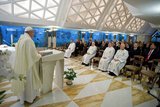| | ||||
Did Pope Francis just tip his hand on Medjugorje? (10 things to know and share) Date: November 18, 2013 Category: Medjugorje News By Jimmy Akin Many people are wondering what will happen at the end of the current investigation of Medjugorje. As a result, they’re trying to figure out what attitude Pope Francis takes toward the reported apparitions. On Thursday, Pope Francis made remarks which some people think tipped his hand and revealed his attitude. Here are 10 things to know and share . . . 1) What is Medjugorje?Medjugorje is a location in Herzegovina where, in 1981, a group of young people began reporting visions of the Virgin Mary. Currently, the Congregation for the Doctrine of the Faith at the Vatican is investigating the reported phenomena. When their investigation is finished, they are expected to report its findings to the Pope, who will make the final determination of what, if anything, is to be done regarding the apparitions. YOU CAN READ MORE ABOUT MEDJUGORJE HERE. 2) Where did Pope Francis make his remarks?He made them in the “fervorino” (informal homily) at his daily Mass on Thursday, Nov. 14. By the Pope’s own request, the full text of these fervorinos are not published, only summaries of them. This means that we need to be somewhat cautious when interpreting them, because we do not have the full remarks. YOU CAN READ THE VATICAN RADIO ACCOUNT OF THE FERVORINO HERE. 3) What did he say about Medjugorje in the fervorino?If the fervorino is taken at face value, he didn’t say anything about Medjugorje. It is not mentioned explicitly. He did make remarks that have been interpreted as a reference to Medjugorje without naming it. 4) What did he say?According to Vatican Radio, Pope Francis was cautioning people against excessive curiosity about the future and contrasting it with the wisdom that comes from the Holy Spirit: Curiosity, the Pope continued, impels us to want to feel that the Lord is here or rather there, or leads us to say: “But I know a visionary, who receives letters from Our Lady, messages from Our Lady”. And the Pope commented: “But, look, Our Lady is the Mother of everyone! And she loves all of us. She is not a postmaster, sending messages every day.” Such responses to these situations, he affirmed, “distance us from the Gospel, from the Holy Spirit, from peace and wisdom, from the glory of God, from the beauty of God.” “Jesus says that the Kingdom of God does not come in a way that attracts attention: it comes by wisdom.” 5) Why would people connect this with Medjugorje?Because several of the Medjugorje seers claim to receive revelations on a daily basis. That is thought to be reflected in the comment that Mary “is not a postmaster, sending messages every day.” On this interpretation, the Pope could be saying—without naming Medjugorje—that he does not think that the type of phenomena that are reported in connection with it are genuine spiritual phenomena. He thus might be thinking of Medjugorje in particular, referring to it without naming it, and signaling his attitude toward it. He might even be signaling this as a way of preparing the faithful who support Medjugorje to adjust to the idea of a negative judgment regarding the authenticity of the apparitions. A variation on this would be that is not thinking of Medjugorje in particular but is expressing a criterion of evaluation that would still lead to a negative judgment. 6) Is that interpretation of his remarks correct?It certainly could be. Both of the variations just mentioned are plausible interpretations of his remarks as reported by Vatican Radio. On the other hand, in the time that Pope Francis has been in office, it’s been clear that Pope Francis often speaks in an off-the-cuff manner which is sometimes imprecise. He knows this, and my understanding is that part of the reason that he didn’t want full texts of the fervorinos released is that he’s speaking informally in a language that is not his native Spanish. He’s not giving formally prepared homilies, and he doesn’t want them read as carefully prepared statements in which we can regard each word as deliberately chosen in advance. As a result, it’s worth asking the question of whether there might be other ways of understanding what he was trying to say (in this fervorino and in any other). Often we must look at the big picture of what he was trying to say and not put too much emphasis on particular expressions. Read the whole article: More questions on Holy See's position on promotion of Medjugorje on NCRegister.com | | |||
|
| ||||
| | ||||



![[O]](/data/olm/images/__mt/nw.gif)